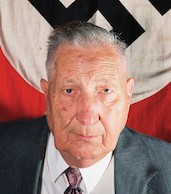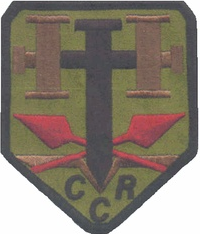Christian Identity is an interpretation of Christianity which advocates the belief that only Celtic and Germanic peoples, such as the Anglo-Saxon, Nordic nations, or people of the Aryan race and people of kindred blood, are the descendants of the ancient Israelites and are therefore God's "chosen people". It is a racial interpretation of Christianity and is not an organized religion, nor is it affiliated with specific Christian denominations. It emerged from British Israelism in the 1920s and began to take shape during the 1940s-1970s. Today it is independently practiced by individuals, independent congregations, and some prison gangs.

The Zionist occupation government, Zionist occupational government or Zionist-occupied government (ZOG), sometimes also referred to as the Jewish occupational government (JOG), is an antisemitic conspiracy theory claiming Jews secretly control the governments of Western states. It is a contemporary variation on the centuries-old belief in an international Jewish conspiracy. According to believers, a secret Zionist organization is actively controlling international banks, and through them governments, in order to collude against white, Christian, or Islamic interests.

Richard Girnt Butler was an American engineer and white supremacist. After dedicating himself to the Christian Identity movement, a racialist offshoot of British Israelism, Butler founded the neo-Nazi group Aryan Nations and would become the "spiritual godfather" to the white supremacist movement, in which he was "a leading figure". He has been described as a "notorious racist".
The Posse Comitatus is a loosely organized American far-right populist social movement which began in the late 1960s. Its members spread a conspiracy-minded, anti-government, and anti-Semitic message linked to white supremacy aiming to counter what they believe is an attack on their social and political rights as white Christians.

The sovereign citizen movement is a loose group of anti-government activists, litigants, tax protesters, financial scammers, and conspiracy theorists based mainly in the United States. Sovereign citizens have their own pseudolegal belief system based on misinterpretations of common law and claim to not be subject to any government statutes unless they consent to them. The movement appeared in the United States in the early 1970s and has since expanded to other countries; the similar freeman on the land movement emerged during the 2000s in Canada before spreading to other Commonwealth countries. The FBI describes sovereign citizens as "anti-government extremists who believe that even though they physically reside in this country, they are separate or 'sovereign' from the United States".

The Northwest Territorial Imperative was a white separatist idea put forward in the 1970s–80s by white nationalist, white supremacist, white separatist and neo-Nazi groups within the United States. According to it, members of these groups were encouraged to relocate to a region of the Northwestern United States—Washington, Oregon, Idaho, and Western Montana—with the intention to eventually turn the region into an Aryan ethnostate. Some definitions of the project include the entire states of Montana and Wyoming, plus Northern California.

Fourteen Words is a reference to two slogans originated by David Eden Lane, one of nine founding members of the defunct white supremacist terrorist organization The Order, and are accompanied by Lane's "88 Precepts". The slogans have served as a rallying cry for militant white nationalists internationally.
In the United States, domestic terrorism is defined as terrorist acts that were carried out within the United States by U.S. citizens and/or U.S. permanent residents. As of 2021, the United States government considers white supremacists to be the top domestic terrorism threat.
Louis Ray Beam, Jr. is an American white supremacist, conspiracy theorist and neo-fascist.
This is a list of topics related to racism:

American militia movement is a term used by law enforcement and security analysts to refer to a number of private organizations that include paramilitary or similar elements. These groups may refer to themselves as militia, unorganized militia, and constitutional militia. While groups such as the Posse Comitatus existed as early as the 1980s, the movement gained momentum after standoffs with government agents in the early 1990s. By the mid-1990s, such groups were active in all 50 US states, with membership estimated at between 20,000 and 60,000. The movement is most closely associated with the American right-wing.

In the United States, the patriot movement is a term which is used to describe a conglomeration of non-unified right-wing populist and nationalist political movements, most notably far-right armed militias, sovereign citizens, and tax protesters. Ideologies held by patriot movement groups often focus on anti-government conspiracy theories, with the SPLC describing a common belief that "despise the federal government and/or question its legitimacy." The movement first emerged in 1994 in response to what members saw as "violent government repression" of dissenting groups, along with increased gun control and the Clinton administration.
The redemption movement is an element of the pseudolaw movement, mainly active in the United States and Canada, that promotes fraudulent debt payment and tax avoidance schemes. Redemption promoters allege that a secret fund is created for every citizen at birth and that a procedure exists to "redeem" or reclaim this fund to pay bills. Common redemption schemes include acceptance for value (A4V), Treasury Direct Accounts (TDA) and secured party creditor "kits," collections of pseudolegal tactics sold to participants despite a complete lack of any actual legal basis. Such tactics are sometimes called "money for nothing" schemes, as they propose to extract money from the government by using secret methods. The name of the A4V scheme in particular has become synonymous with the movement as a whole.
James Paul Wickstrom was an American white supremacist, far-right activist, and Christian Identity minister. He was a founding member of the Posse Comitatus, an antisemitic, anti-government and anti-tax group associated with the broader militia movement. He was strongly anti-communist, and he frequently advocated the genocide of Jews, non-European Americans, "race traitors," homosexuals, and drug addicts.

Richard Ivan Mack is the former sheriff of Graham County, Arizona and a political activist. He is known for his role in a successful lawsuit brought against the federal government of the United States which alleged that portions of the Brady Handgun Violence Prevention Act violated the United States Constitution. He is a former lobbyist for Gun Owners of America (GOA) and a two-time candidate for United States Congress. Mack is also the founder of Constitutional Sheriffs and Peace Officers Association (CSPOA), and established the "County Sheriff Project" movement, both of whom reaffirm what they claim is the constitutional power to refuse to enforce federal laws. Further to this, he sits on the board of directors of the Oath Keepers, a far-right militia group.
"Paper terrorism" is a neologism referring to the use of false liens, frivolous lawsuits, bogus letters of credit, and other legal or pseudolegal documents lacking sound factual basis as a method of harassment against an opponent on a scale described as evocative of conventional armed terrorism. These methods are popular among some American anti-government groups and those associated with the redemption movement.
In the politics of the United States, the radical right is a political preference that leans towards ultraconservatism, white nationalism, white supremacy, or other far-right ideologies in a hierarchical structure which is paired with conspiratorial rhetoric alongside traditionalist and reactionary aspirations. The term was first used by social scientists in the 1950s regarding small groups such as the John Birch Society in the United States, and since then it has been applied to similar groups worldwide. The term "radical" was applied to the groups because they sought to make fundamental changes within institutions and remove persons and institutions that threatened their values or economic interests from political life.
William Potter Gale was an American political activist who was involved with several white supremacist groups, including Christian Identity and the Posse Comitatus. He had connections to the Church of Jesus Christ–Christian, Aryan Nations, the sovereign citizen movement, and the militia movement.

The Rocky Mountain Rendezvous was an October 1992 meeting in Estes Park, Colorado of 150 to 175 adherents and leaders of the American militia movement, Patriot movement and the radical right that developed the modern strategy for right-wing terrorism in the United States. The Rendezvous was organized by Christian Identity Pastor Pete Peters in response to the Ruby Ridge standoff two months prior. Concerns included that the United States federal government was a police state engaged in systematic over taxation, wrongful imprisonment and murder of its citizens, described by the meeting as "genocide."








